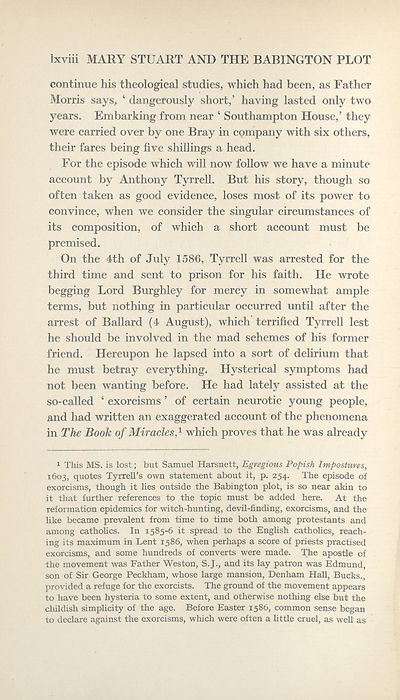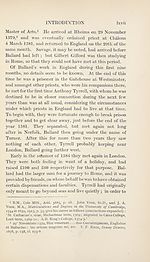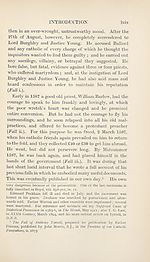Series 3 > Mary Queen of Scots and the Babington plot
(73) Page lxviii
Download files
Complete book:
Individual page:
Thumbnail gallery: Grid view | List view

Ixviii MARY STUART AND THE BABINGTON PLOT
continue his theological studies, which had been, as Father
Morris says, ‘ dangerously short,’ having lasted only two
years. Embarking from near ‘ Southampton House,’ they
were carried over by one Bray in company with six others,
their fares being five shillings a head.
For the episode which will now follow we have a minute
account by Anthony Tyrrell. But his story, though so
often taken as good evidence, loses most of its power to
convince, when we consider the singular circumstances of
its composition, of which a short account must be
premised.
On the 4th of July 1586, Tyrrell was arrested for the
third time and sent to prison for his faith. He wrote
begging Lord Burghley for mercy in somewhat ample
terms, but nothing in particular occurred until after the
arrest of Ballard (4 August), which terrified Tyrrell lest
he should be involved in the mad schemes of his former
friend. Hereupon he lapsed into a sort of delirium that
he must betray everything. Hysterical symptoms had
not been wanting before. He had lately assisted at the
so-called ‘ exorcisms ’ of certain neurotic young people,
and had written an exaggerated account of the phenomena
in The Book of Miracles,1 which proves that he was already
1 This MS. is lost; but Samuel Harsnett, Egregious Popish Impostures,
1603, quotes Tyrrell’s own statement about it, p. 254. The episode of
exorcisms, though it lies outside the Babington plot, is so near akin to
it that further references to the topic must be added here. At the
reformation epidemics for witch-hunting, devil-finding, exorcisms, and the
like became prevalent from time to time both among protestants and
among catholics. In 1585-6 it spread to the English catholics, reach¬
ing its maximum in Lent 1586, when perhaps a score of priests practised
exorcisms, and some hundreds of converts were made. The apostle of
the movement was Father Weston, S. J., and its lay patron was Edmund,
son of Sir George Peckham, whose large mansion, Denham Hall, Bucks.,
provided a refuge for the exorcists. The ground of the movement appears
to have been hysteria to some extent, and otherwise nothing else but the
childish simplicity of the age. Before Easter 1586, common sense began
to declare against the exorcisms, which were often a little cruel, as well as
continue his theological studies, which had been, as Father
Morris says, ‘ dangerously short,’ having lasted only two
years. Embarking from near ‘ Southampton House,’ they
were carried over by one Bray in company with six others,
their fares being five shillings a head.
For the episode which will now follow we have a minute
account by Anthony Tyrrell. But his story, though so
often taken as good evidence, loses most of its power to
convince, when we consider the singular circumstances of
its composition, of which a short account must be
premised.
On the 4th of July 1586, Tyrrell was arrested for the
third time and sent to prison for his faith. He wrote
begging Lord Burghley for mercy in somewhat ample
terms, but nothing in particular occurred until after the
arrest of Ballard (4 August), which terrified Tyrrell lest
he should be involved in the mad schemes of his former
friend. Hereupon he lapsed into a sort of delirium that
he must betray everything. Hysterical symptoms had
not been wanting before. He had lately assisted at the
so-called ‘ exorcisms ’ of certain neurotic young people,
and had written an exaggerated account of the phenomena
in The Book of Miracles,1 which proves that he was already
1 This MS. is lost; but Samuel Harsnett, Egregious Popish Impostures,
1603, quotes Tyrrell’s own statement about it, p. 254. The episode of
exorcisms, though it lies outside the Babington plot, is so near akin to
it that further references to the topic must be added here. At the
reformation epidemics for witch-hunting, devil-finding, exorcisms, and the
like became prevalent from time to time both among protestants and
among catholics. In 1585-6 it spread to the English catholics, reach¬
ing its maximum in Lent 1586, when perhaps a score of priests practised
exorcisms, and some hundreds of converts were made. The apostle of
the movement was Father Weston, S. J., and its lay patron was Edmund,
son of Sir George Peckham, whose large mansion, Denham Hall, Bucks.,
provided a refuge for the exorcists. The ground of the movement appears
to have been hysteria to some extent, and otherwise nothing else but the
childish simplicity of the age. Before Easter 1586, common sense began
to declare against the exorcisms, which were often a little cruel, as well as
Set display mode to:
![]() Universal Viewer |
Universal Viewer | ![]() Mirador |
Large image | Transcription
Mirador |
Large image | Transcription
Images and transcriptions on this page, including medium image downloads, may be used under the Creative Commons Attribution 4.0 International Licence unless otherwise stated. ![]()
| Scottish History Society volumes > Series 3 > Mary Queen of Scots and the Babington plot > (73) Page lxviii |
|---|
| Permanent URL | https://digital.nls.uk/127234917 |
|---|
| Attribution and copyright: |
|
|---|
| Description | Over 180 volumes, published by the Scottish History Society, containing original sources on Scotland's history and people. With a wide range of subjects, the books collectively cover all periods from the 12th to 20th centuries, and reflect changing trends in Scottish history. Sources are accompanied by scholarly interpretation, references and bibliographies. Volumes are usually published annually, and more digitised volumes will be added as they become available. |
|---|


